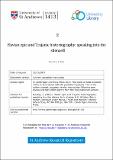Flavian epic and Trajanic historiography : speaking into the silence
Abstract
Tacitus’ proem to the Agricola characterises the Flavian period as one lived through by a “silent generation”, and his contemporary Juvenal rails against the pointlessness of contemporary mythological epic (Sat.1.1-11). It seems at first glance then that Flavian epic, and in particular the mythological epic of Valerius Flaccus, might have no role to play in analysis of Tacitus’ depiction of Domitianic Rome – itself a pointed refraction of a new Nervan-Trajanic world order in which Tacitus is free to speak again. Yet recent work on the interaction between the genres of epic and historiography has found common ground in the themes of heroism and tyranny, in ethnography and theories of causation, and even in compositional method (cf. esp. Miller & Woodman (2010); Joseph (2012)). This chapter will explore the possibility that, despite the apparent gulf that lies between them, interactions can be traced on a variety of levels between a number of features of Flavian epic and Tacitean historiography. The chapter will take its start from Valerius Flaccus’ Argonautica, a text that has long been deemed “Tacitean” in its pessimistic tone. Beginning with analysis of the tension Argonautica creates between the optimistic teleology authorized by a new (Flavian) ruling dynasty and the cynical recognition that this epic is inaugurated by political in-fighting and civil war, I will argue that Valerius’ self-defeating narrative offers an epic anticipation of the historiographical approach to causation that Tacitus offers in his Histories. This will raise questions not just about the divide between Flavian and post-Flavian literature that Tacitus himself (amongst others) worked so hard to establish (cf. Ash and Rimell) but also about intertextuality: does this seeming continuity in tone and analysis amount to “interactivity” as such, or perhaps a looser kind of interdiscursivity that operates more at the level of consumption than production? Moving from reflections on nebulous kinds of overlap (and the role of reader-response in activating them) to more explicit examples of literary ‘interaction’, this chapter will then focus on another anticipation of another Tacitean ‘innovation’: the categorisation not just of bella externa and bella civilia, but also bella permixta (Hist.1.2). In Valerius’ war at Colchis, which offers a mythologized Bellum Dacicum, incorporating Sarmatians, Alans, Rhoxolani – and even, figured in simile, Roman legions at war with each other – I will argue that Valerius’ exploration of Roman identity against a backdrop of ‘mixed war’ anticipates (and possibly informs) Tacitus’ own account of Rome and its empire under Domitian. Working out from possible moments of ‘direct’ allusion, to ‘window-tier’ reference via Lucan (cf. also Marchesi’s chapter), I will suggest that Valerius’ approach to warfare, conditioned by generic convention, makes an important contribution to a distinctly on-trend broader conversation about metus hostilis and ‘mixed’ warfare – cf. esp. Silius’ Punica with Jacobs (2010); Josephus’ Jewish War with Mason (2005); Frontinus’ Stratagemata with König (2014); Pliny’s Panegyricus with Low (2013) – that serves to bridge the Flavian and Nervan-Trajanic eras. As well as prompting further reflections on the nature and significance of overlaps between texts circulating in supposedly different political periods, this will probe the role played by genre in particular in the emergence/deployment and identification/interpretation of interactions between individual works.
Citation
Buckley , E 2018 , Flavian epic and Trajanic historiography : speaking into the silence . in A Koenig & C Whitton (eds) , Roman Literature under Nerva, Trajan and Hadrian : Literary Interactions, AD 96–138 . Cambridge University Press , Cambridge , pp. 86-107 . https://doi.org/10.1017/9781108354813.005
Publication
Roman Literature under Nerva, Trajan and Hadrian
Status
Peer reviewed
Type
Book item
Collections
Items in the St Andrews Research Repository are protected by copyright, with all rights reserved, unless otherwise indicated.

